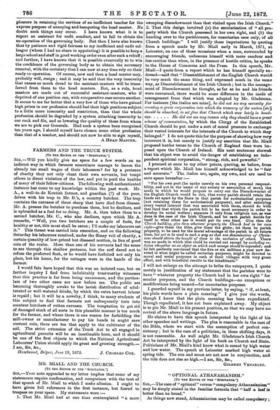MR. MIALL AND THE CHURCH.
(TO THE EDITOR OF THE "SPECTATOR.')
SIR,—Your note appended to my letter implies that some of my statements require confirmation, and comparison with the text of that speech of Mr. Miall to which I make allusion. I ought to have given full references in the first instance, but feared to trespass on your space. My statements were :—
1. That Mr. Miall bad at one time contemplated "a more
sweeping disendownient than that visited upon the Irish Church." 2. That this design involved (a) the secularisation of "all pro- perty which the Church possessed in her own right, and (b) the handing over to the parishioners, for unsectarian uses only, of all Church buildings." I will justify these imputations by quoting from a speech made by Mr. Miall early in March, 1871, at Leicester, on one of those occasions when a man, surrounded by encouraging friends, unbosoms himself with more candour and less caution than when, in the presence of hostile critics, he speaks to the House of Commons and the Press. In this speech, Mr. Miall—I quote from a report which he has himself specially en- dorsed—said that " Disestablishment of the English Church would be very much the same thing, and expressed much in the same way, as Disestablishment of the Irish Church ; but in the manage- ment of Disendowment he thought, as far as he and his friends were concerned, there would be some difference in the mode of management from that which was adopted by Mr. Gladstone. For instance [the italics are mine], he did not see any necessity for creating a great corporation into which the treasury of the nation [sic] should be absorbed, to set free that Church which was lately in bond- age He did not see any reason why they should have a great scheme of commutation, by which the Clergy of the Established Church should be put under a sort of moral pressure to exchange- their vested interests for the interests of the Church to which they belonged." I do not quote this for the purpose of showing how very incorrect it is, but merely to justify my assertion that Mr. Miall proposed harder terms to the Church of England than were im- posed upon the Church of Ireland. His next sentences showed that his object was to avoid the danger of establishing an inde- pendent spiritual corporation, "strong, rich, and powerful."
I proceed at once to my other points, quoting, as before, from, a report which Mr. Miall has himself acknowledged to be "fair and accurate." The italics are, again, my own, and are used to, save space hereafter :— "For his own part (he spoke merely on his own personal responsi- bility, and not in the name of any society or association of men), the mode in which he would propose to carry out the Disendowment of the English Church would be this, that every parish should retain the funds set apart by the State in that parish for ecclesiastical purposes (not retaining them for ecclesiastical purposes), and after satisfying every vested interest that was associated with them, should do with that fund that which ihe parish felt to be most necessary in order to develop its social welfare; separate it only from religious use, as was done in the case of the Irish Church, and let each parish decide for itself to what other use it would put its own fund. Give them the Church building, give them whatever property the Church had in her ow& right—give them the tithe, give them the glebe; let them be parish property, to be used for the moral advantage of the parish in all future, time, but not to be used in such a way as that one denomination of Christ- ians should obtain the benefit of them to the exclusion of others. There- was no mode in which that could be carried out except by excluding re- ligion altogether as an object on which such moneys should be expended; and he felt perfectly convinced that the five or six millions a year now de- voted to what might be called sectarian purposes, might be devoted to moral and social purposes in each of their villages with very great effect, and with beneficial results to the inhabitants."
I will not enlarge on the attempt to bribe the ratepayers, I quote merely in justification of my statement that the parishes were to have "whatever property the Church had in her own right" for secular purposes, and the Church buildings—no exceptions or- modifications being named—for unsectarian purposes.
I guarded myself in my previous letter, by saying, "if, at least, his plain words have a plain meaning." I give you the words, though I know that the plain meaning has been repudiated. Though repudiated, it has not been explained away. My object is to pin Mr. Miall to his present position, so that we may have no, revival of the above language in future.
He claims to have this speech interpreted by the light of his- other speeches and writings. The plea is reasonable in the case of the Bible, where we start with the assumption of perfect con- sistency; but in the case of a politician, in these shifting days, it is not reasonable. As well might Mr. Gladstone's Irish Church, Act be interpreted by the light of his book on Church and State. Politicians of Mr. Allan's kind know what is meant by high water and low water. The speech at Leicester marked high water at spring tide. The sun and moon are not now in conjunction, and. the tide does not rise so high.—I am, Sir, SZO.,
GILBERT VENABLES.


































 Previous page
Previous page